Why Each of the Myers-Briggs® Personality Types Feels Like People Don’t “Get” Them
Now more than ever it seems like people feel misunderstood, alone, or “unseen.” I get dozens of emails every day from people who wish that their families, partners, and friends would get the underlying motives behind what they’re doing instead of judging them for being different than the norm (whatever that is). I’m not sure what the root cause of this. Maybe it’s because I’m an MBTI® practitioner, so a lot of people think I can give them answers. Maybe it’s because we live in a world where less people spend time together in person and online communications are more rife with misunderstandings. But whatever the case, I’ve found that each of the 16 personality types really wish people would understand a specific motive, character quality, or desire that they have. Let’s get into it!
Not sure what your personality type is? Take our new personality questionnaire here. Or you can take the official MBTI® here.

Here’s What You Wish People Understood About You, Based On Your Personality Type
Table of contents
- Here’s What You Wish People Understood About You, Based On Your Personality Type
- The ISTJ – You Care, But It’s Nobody’s Business
- The ISFJ – You’re Not Just a Servant
- The ESTJ – Your Actions Speak to Your Heart
- The ESFJ – You’re More Than Just a “Nice Person”
- The ISTP – You’re Actually Not a Jerk
- The ISFP – Still Waters Run Deep
- The ESTP – Your Action-Oriented Nature isn’t Shallow
- The ESFP – You’re Not Just “A Party Animal”
- The INTJ – You Actually Have a Heart
- The INFJ – You Need to Disappear Every Now and Then
- The ENTJ – It’s Not Meanness, It’s Efficiency
- The ENFJ – You Want to Explore Deeper Territory
- The INTP – You Want to be Allowed to be Heard
- The INFP – More Than Just “Sensitive”
- The ENTP – You’re Not Just a “Troll”
- The ENFP – Your Type Code Isn’t Synonymous with Being Flighty
- What Do You Think?
Estimated reading time: 20 minutes
The ISTJ – You Care, But It’s Nobody’s Business
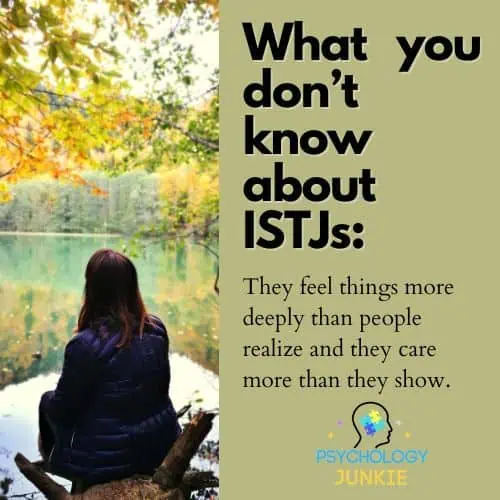
Yes, you may look like you’ve got all the passion and emotion of Darth Vader on karaoke night. But this doesn’t mean there’s not a lot going on under the surface. As an ISTJ you’re focused on actions that show you care more than words that show you care. You hate having to muster up all the emotions you feel and try to display them on your face for other people to get the point. Sometimes people just assume you’re insensitive or cold, when really you think a lot about the impact you have on others. It just feels awkward to force emotions outwardly. It feels contrived and even manipulative sometimes, and that’s the last thing you want to be. But if people gave you the chance instead of judging the outside, they’d see there’s a lot more to you than meets the eye.
Find out more about ISTJs: The Childhood Struggles of ISTJs
The ISFJ – You’re Not Just a Servant

Yes, we all know that ISFJs care about people and will go out of their way to make others happy. But that’s not all you are. You have the ability to zero in and focus on what you’re doing 110%. This laser focus and precision with details is something that can make you excel in the workforce, in the kitchen, and heck…even with sharp objects. I once knew an ISFJ who did knife throwing for fun. Not cake baking. Knife throwing. When ISFJs set their minds to something, they’re almost unstoppable because they HAVE to master it and understand all the ins and outs of it. They’re specialists with hearts of gold; so people better not underestimate you. You’re more than the person working behind the scenes to make other people’s lives better.
The ESTJ – Your Actions Speak to Your Heart
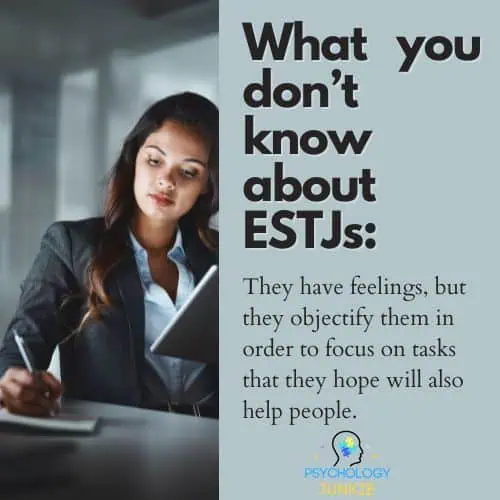
Sometimes you get called bossy or pushy, but your standards are equally high for yourself, if not more so, than they are for others. You don’t just work to check off a box (although, sure, that does feel pretty good). You work to forward causes and goals that matter to you. The paycheck is one thing, but what is it helping? Many ESTJs put their money towards causes or communities that matter to them. ESTJs know that working hard pays off, and you aim for others to reap those rewards too. How can the people you care about grow without belief and encouragement? Efficiency makes life smoother for everyone. You get tired of people labeling you as “bossy” or seeing your direction as controlling rather than seeing the heart behind what you do.
The ESFJ – You’re More Than Just a “Nice Person”

ESFJs often feel boxed into the “people pleaser” label, and get irritated with the idea that that’s “all they are.” Because to ESFJs, that’s often how they’ve been treated. They’re the person who listens when people need to trauma dump. They’re the person you go to when you need emotional support. But there’s more to the ESFJ than that. They possess a profound curiosity, seeking depth and knowledge beyond mere surface interactions. Despite their enormous desire to understand others, they sometimes find themselves reduced to being the empathetic listener, the friendly host, or the amiable extrovert. The truth is, ESFJs also have Introverted Thinking as part of the core of their personality. They love diving into information, exploring subjects in-depth, and developing mastery. I knew an ESFJ who knew everything there was to know about midwifery, another who was an English professor, and another who could tell you how to grow just about any plant in the worst possible soil. Yes, ESFJs can be friendly, warm, and supportive, but they’re not “just” those things.
The ISTP – You’re Actually Not a Jerk
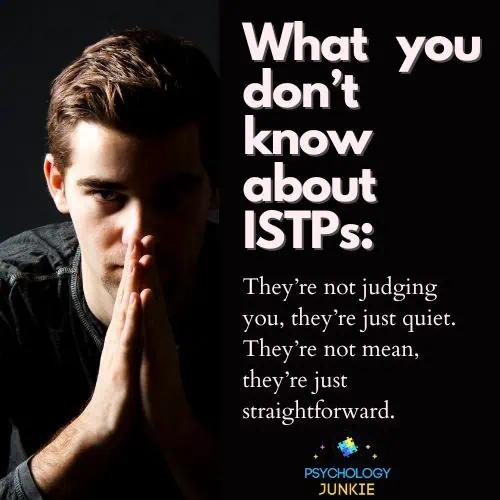
Quiet, analytical, and calm. You don’t make a big show of effusiveness when people try to talk to you; and your “resting ISTP face” can look a little intimidating to people who don’t know you very well. People often mistakenly assume you’re cold, hostile, or intentionally intimidating, when really you’re just observing the people and world around you without a lot of judgment (unless people are being overtly stupid).
You’re often misunderstood as being far less feeling than you really are. I was close friends with an ISTP once when I was in my early twenties, and we were both wildly in love with each other. But, guess what? He was an ISTP and I’m an INTJ. Neither of us knew, and both of us had resting “disinterested “faces, so we went about our separate lives assuming the other didn’t care. Years later, we found out we had. This is the problem of being an Introvert and a Thinker. I’ve known ISTPs who have been reprimanded by parents, employers, and partners to no end because people assume they’re being disrespectful, mean-spirited, or cold, simply because they’re quiet and have less animated facial expressions than other people. ISTPs are actually some of the most laid-back, accepting people you’ll meet; just don’t try to control them and they’re probably not thinking something negative about you (unless you’re a bad driver or one of those people who walks slowly in the middle of a grocery aisle so others can’t get around you).
Find out more about ISTPs: 24 Signs That You’re an ISTP, the Vigilante Personality Type
The ISFP – Still Waters Run Deep
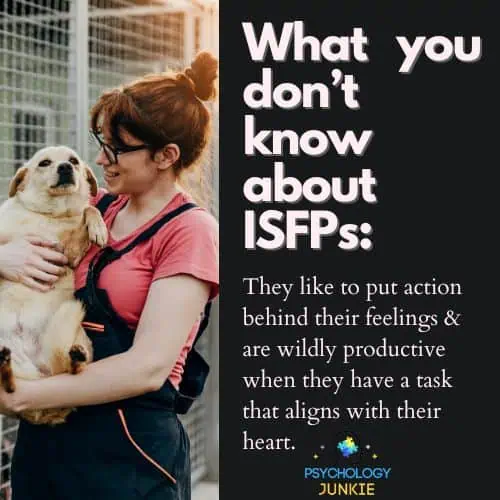
ISFPs, like ISTPs, tend to have a cool, mysterious demeanor. On the outside they tend to look calm and unreadable, but inside they feel things deeply and have a lot of convictions, emotions, thoughts, and feelings. People often underestimate the depth of their feelings or assume they’re disinterested simply because they’re quiet. Still others judge them for having a more laid-back, flexible way of life and not being as focused on long-term plans or big commitments. While there are certainly ISFPs who do this, many explore a variety of different avenues in life, looking for projects and careers that align with their values while giving them the variety they crave. Often people try to push ISFPs into a more “standard model” of behavior; urging them to be more expressive, more jovial, or more predictable. Unfortunately, this only works to make ISFPs feel more misunderstood and to pull more away instead of closer.
Find out more about ISFPs: Why ISFPs Struggle with Loneliness, and How to Cope
The ESTP – Your Action-Oriented Nature isn’t Shallow
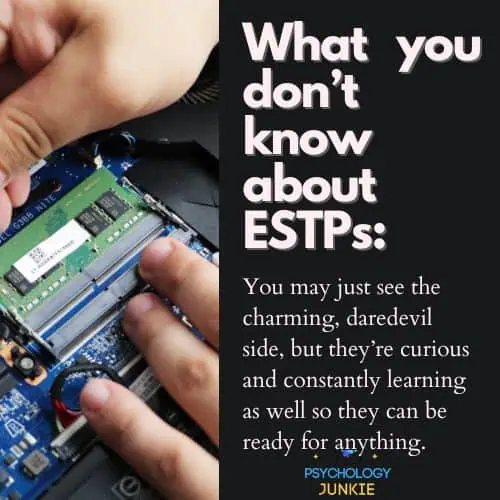
I have so often heard ESTPs referred to as “shallow” or “irresponsible,” especially in online type communities where you’d think people would have more understanding. These Daredevil personality types thrive on spontaneity, and are always on the alert for changes, surprises, and the unexpected. This very adaptability is what makes ESTPs invaluable in times of crisis. When the unexpected strikes, they don’t waste time “crying over spilled milk.” Instead, they assess the situation proactively, often being the first to jump into action.
When you’ve had a car accident and you need someone to calmly handle the situation, you won’t be complaining to an ESTP that they’re “shallow” then.
Translate this into dozens of different contexts and you can see why an ESTP’s no-nonsense, action-driven approach is incredibly valuable. When I think of ESTPs I often think of Spartan warriors. People who can think rationally and swiftly in the midst of a crisis and take action to defeat a threat. But this isn’t all ESTPs are, either. They can be deeply caring, contemplative, analytical, and sensitive as well. But they’re not going to show you that side if you belittle them or label them negatively because of their other natural personality traits.
The ESFP – You’re Not Just “A Party Animal”
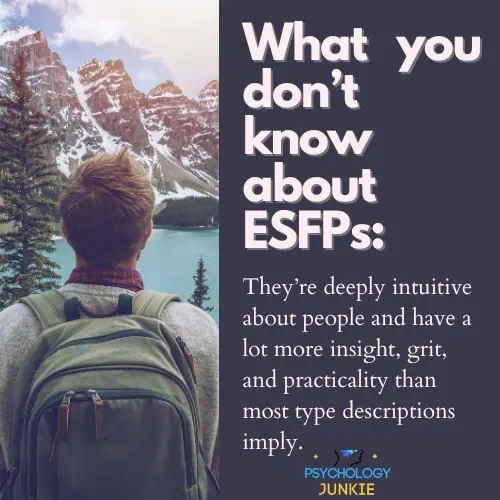
Some of the worst type descriptions I’ve ever seen online have been about ESFPs. Often called “the Entertainers” or “the Party Animals”, ESFPs get limited to this very shallow, impulsive, cheerleader type of person that I’ve never met in real life.
Yes, ESFPs are often social, outgoing, and friendly. And they tend to enjoy a good party or a spontaneous adventure. But this doesn’t mean that they lack depth, introspection, or logic.
Most of the ESFPs I’ve known have been staggeringly witty; humorous in a clever way that is so impressive and winning you can’t help but wish you were like them. They’ve also been passionate, creative, and concerned with specific causes that matter to them. My two closest friends where I live at the moment are ESFPs. Why? Because they haven’t let getting older stop them from seeing the beauty in life. They still know how to have fun, enjoy the moment, and make life an adventure – something I find lacking in many of the judging women I meet that are my age. We take our kids to the beach and actually play in the water and jump in the waves rather than worry about messing up our hair. But these ESFPs are also are deeply accepting, unflinchingly honest, funny, smart, and intuitive about people. Yet many ESFPs try to avoid being labeled as ESFPs because the associations with that type are often so shallow and even demeaning.
The INTJ – You Actually Have a Heart

There’s a common misconception floating around that INTJs are these robotic overlords of arrogance, judgment, and superiority. But here’s the real deal – they actually care – a lot. Sure, INTJs might not be the most expressive with their faces, leading some people to assume they’re either displeased or just plain angry when in reality, they’re probably pondering the mysteries of the universe (or maybe just deciding what to eat for dinner). And when it comes to giving feedback, INTJs are all about improving the blueprint. It’s not that they enjoy pointing out flaws for the sake of it; they genuinely believe they’re being helpful by offering logical solutions. Imagine seeing a friend trying to open a door by pushing, when clearly, it says pull. Wouldn’t you tell them? That’s an INTJ’s instinct — especially if they care about you. The frustration kicks in when these well-intentioned observations are met with eye rolls, accusations of being a “know-it-all”, or being dubbed uncaring. Truth be told, INTJs care, maybe too much, about efficiency and making things better. If there’s a way to solve a problem or make a process more streamlined, you bet they’re going to speak up. It’s not about being right; it’s about getting it right.
Discover more about INTJs: Why INTJs Struggle with Loneliness, and How to Cope
The INFJ – You Need to Disappear Every Now and Then

If you’re friends with an INFJ, there’s one thing you need to know. They have to have the freedom to ghost the world on occasion. Sounds dramatic? Maybe, but hear me out. Their warmth, empathy, and stellar listening skills make them emotion magnets for people who have a lot of troubles to unload. Great for empathy, not so great when they become everyone’s emotional landfill. Whether it’s the barista who just broke up with her boyfriend or the neighbor who’s overwhelmed with life, somehow, their stories and sorrows find a way to the INFJ. And they care, they really do. But being a magnet for everyone’s emotional baggage is downright exhausting.
That’s why sometimes, INFJs just need to hit the pause button. Disappear. Vanish into their own world where the only emotions they need to contend with are their own. It’s not that they’re trying to be dramatic or mysterious, and it definitely doesn’t mean they’ve stopped caring. Far from it. They’re just trying to recharge, to find their balance again so they can come back and be the friends and confidants they truly want to be. If they stick around without these breaks, they risk burning out or worse, becoming indifferent. No one gets it, though. They see the INFJ’s withdrawal as a sign of disloyalty or lack of interest, which couldn’t be further from the truth.
Find out more about INFJs: 7 Extremely Annoying Challenges INFJs Face Regularly
The ENTJ – It’s Not Meanness, It’s Efficiency

The ENTJ is often painted as the embodiment of the cold, calculating executive — someone who values efficiency over emotions, and results over relationships. I mean, almost every evil villain in a movie is typed by “professionals” as an ENTJ or an INTJ. However, this stereotype misses the mark by a wide margin. Yes, ENTJs are driven, ambitious, and have an uncanny ability to strategize and foresee outcomes. But what a lot of people fail to see is that their directness and logical approach stem from a place of caring and a genuine desire to achieve the best possible results — not only for themselves but for the team or organization as a whole.
When an ENTJ points out a flaw in a plan or a faster way to accomplish a task, it’s not an attempt to belittle others or show off their own intelligence (unless they’re an unhealthy ENTJ). Usually it’s their way of helping everyone involved to avoid pitfalls and succeed more effectively. Their focus on the end goal, coupled with their keen insight into how things could unfold, can make them seem impatient or insensitive to those who prioritize emotional considerations or finer details. But for the ENTJ it’s simply about putting their emotions aside so that they can do their best work for everyone involved – not just for themselves. ENTJs wish others could understand that their motivations are not rooted in a desire to dominate or dismiss others’ feelings but in a sincere concern for achieving the best outcomes.
The ENFJ – You Want to Explore Deeper Territory

ENFJs are often seen as the social butterflies, the charismatic leaders, or the friendly hosts. If you’re an ENFJ, you’re probably the glue in your circle, intuitively tuning into and lifting the spirits of those around you. But what many don’t see is the weight of that emotional labor. Yes, you’re empathetic, and yes, you do an amazing job of navigating and soothing the emotions of others. But at what cost to yourself?
Sometimes, after a long day of being everyone else’s anchor, you come back to a quiet home and wonder, “who am I beneath all these layers?” Because, truth be told, you’ve been so busy tuning into everyone else’s frequencies that you’ve barely had a moment to listen to your own. Your dreams, aspirations, and personal musings tend to take a backseat when you’re so used to being everyone else’s mentor or cheerleader.
Chances are, you’re looking for someone who wants to get to know how you tick as much as how you try to figure out other people. Someone who asks not just how you are, but who’s genuinely interested in what makes you…you. What are your dreams? Your fears? What thoughts keep you awake at night? ENFJ, amidst the hustle of being everything for everyone, sometimes you wish for that someone who wants to explore the universe of ideas and possibilities within you. After all, behind your nurturing and upbeat demeanor lies a rich inner world, filled with intricate thoughts and untold dreams, the world of your intuition.
The INTP – You Want to be Allowed to be Heard
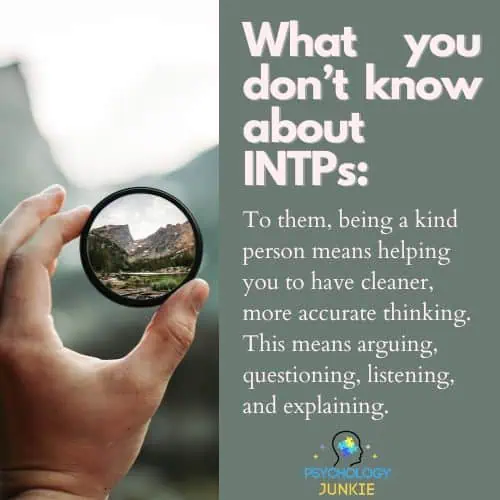
I’ve rarely met an INTP who grew up in an environment where their skeptical thoughts, analytical musings, and creative ideas were met with acceptance and curiosity. To the outside world, their penchant for precision and depth in logic can come off as pedantic or even nitpicky, especially when they dive deep into the specifics of a topic, unwilling to leave any stone unturned. As children they are often reprimanded for being “argumentative,” when they pose questions, critique logic, or otherwise don’t accept what they’ve been told without question. But what’s often dismissed as needless thoroughness is, in fact, their way of making sense of the world — a world they understand through patterns, systems, and logic.
It’s deeply frustrating for INTPs to have their inner world rejected or met with confusion or disinterest. These types see the beauty in complexity, the joy in a well-structured argument. It’s fascinating to them to connect disparate ideas into a hidden truth. But instead of having this side of themselves nourished through relationships, many times people want them to over-simplify things or just be “normal.” It’s not that INTPs don’t know how to do that, it’s just not where they thrive. What they really want is for others to understand and appreciate their unique way of thinking and see the value in their abstract, sometimes unconventional ideas.
The INFP – More Than Just “Sensitive”
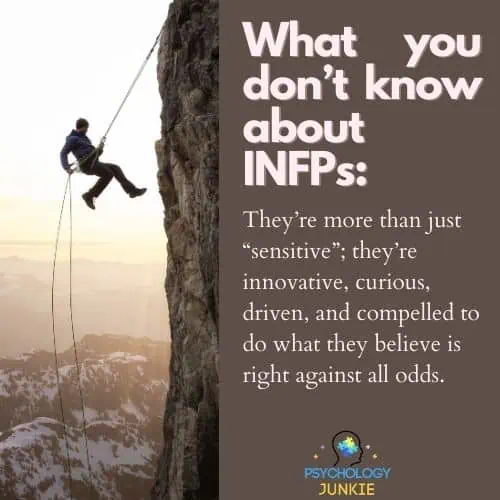
I’m glad I’m on the INFP section, because these types have been the brunt of an overwhelming number of inaccurate portrayals online. To some, they’re the quintessential “crybabies” of the personality types — a label unfairly slapped on them by those who skim superficially through type descriptions without truly understanding the depth of what it means to be an INFP. I’ve never met an INFP who fit the whole “crybaby” “oversensitive” description anyway. Some people see the emotional awareness, the passion, and they stop there, not bothering to explore the richness that lies beneath. They miss the galaxies of imagination swirling inside the INFP’s mind, and the passion they have to stand up for what they believe in against all odds.
In real life, many INFPs are seen as “unrealistic” or too heart-driven. They’re labeled as dreamers and some people think they should shelve their dreams away and focus on more “practical” matters. But for the INFP, they live in a world where anything is possible if you put your mind and heart into it. INFPs are visionaries who see beyond what’s tangible towards what could be. And yes, sometimes that means they will get hurt along the way — but that doesn’t stop them from dreaming and fighting for their beliefs. They may be sensitive, but they aren’t just sensitivity – they’re also innovative, creative, and driven to put action behind their dreams. So let’s not reduce INFPs to just “sensitive” beings, when they have so much more depth and power within them. Just check out my article on 10 INFPs who changed the world to affirm that these types should not be underestimated.
The ENTP – You’re Not Just a “Troll”
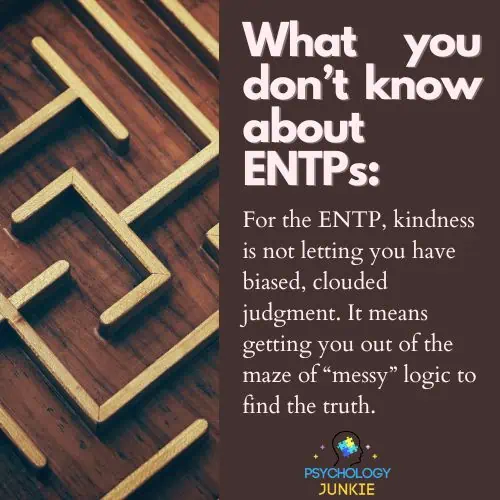
The ENTPs out there know the drill. Often cast as the rambunctious trolls of the group, they’re the ones bringing a spark of debate to every conversation. But here’s the thing – they’re not just trying to stir the pot for the sake of it. ENTPs are driven by a genuine curiosity and a desire to dissect ideas, to challenge convention, and yes, to play devil’s advocate. But it’s not about causing trouble; it’s about unveiling truths, exploring new angles, and refining people’s thought processes.
Truth be told, ENTPs are one of the types least likely to email me and complain about being misunderstood. I often find them to be optimistic and well able to roll-with-the-punches. Some even play into their whole “troll” bit with glee, even if it’s not entirely accurate. But they still wish people wouldn’t misread their motives 99% of the time. There’s just this itch inside them to create more clarity and open people’s eyes to more truth and less bias and clouded judgment. When they point out a flaw in logic or introduce an unconventional perspective, it’s not a personal attack or a mere act of rebellion. It’s an invitation to explore, to think deeper, to question. And sure, their humor can sometimes walk the line between brilliant and blasphemous, at least in the eyes of those not ready to hear it. Yet, beneath these layers of nonchalance and provocations, there’s a simple desire – that people could sometimes see the value in the unorthodox, understand that not all truths are sweet, and recognize that breaking from tradition can lead to amazing discoveries.
The ENFP – Your Type Code Isn’t Synonymous with Being Flighty
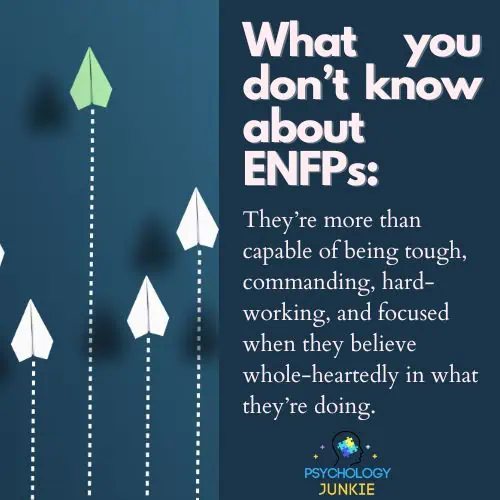
As an ENFP, you’re usually described as being fun-loving, friendly, and full of enthusiasm. And that’s often true. But you’re also described as “vomiting rainbows,” being constantly distractible, and overly-flighty in most online descriptions. Most ENFPs I know are sick of the stereotype, because it’s often how people have limited or misunderstood them in real life as well.
You long for conversations that delve deeper into profound topics and ideas, surpassing the surface level that most people stick to. You care deeply about causes and issues that matter to people (or animals) who many people overlook. I know an ENFP who rescues injured opossums. She’s practical, compassionate, and deeply empathetic while also being able to handle the complexities of healing animals hardly anyone knows (or cares) about. She’s just one of many examples of ENFPs who have used their gifts to make a dramatic difference for lesser-known people or animals that need it.
For many ENFPs, material possessions like clothes and cars hold little significance. Instead, they prefer contemplating the meaning of life; why are we here? what is our potential? what possibilities exist that nobody has wondered about before? ENFPs are dreamers but they’re also doers. Famous ENFPs like Walt Disney, Michio Kaku, and Andrew Yang have used their type strengths to change the world. There’s a lot of intellectual curiosity and hard work that goes into being “the champion” or “the visionary”, and more of us need to believe in what this type is capable of doing.
What Do You Think?
Do you resonate with these descriptions? How have you felt misunderstood and how do you think people could understand you better in life? Leave your thoughts in the comments for us and other readers to learn from!
Subscribe to Our Newsletter

Want to discover more about personality type? Get the inside scoop with Susan Storm on all things typological, along with special subscriber freebies, and discounts on new eBooks and courses! Join our newsletter today!












Hello Susan,
I think I might be able to at least partially answer why people in the West and America in particular are so alone, lonely and isolated. (Have you ever noticed the substantial pet food section of supermarkets now? People are so lonely they turn to animals for solace.)
Recall we live in an economic system of capitalism. Although many, perhaps most Americans don’t know it or don’t want to recognize it, we are very much a class based society in contradiction to our advocacy of equality. Although this country was founded with the ideal of equality the economic system can’t allow that, at least not economically.
The small minority of capitalist “owners of the means of production” (to borrow from Karl Marx) have used the economic system to accumulate enormous wealth. If the working class (the lower 90% or so)ever united in solidarity they could overwhelm the small capital ownership class and demand a more equitable distribution of the wealth of society through better wages (a “living wage” not a wage-slave minimum wage) and a progressive income tax on wealth. (Under the administration of Franklin Roosevelt the very wealthy paid about a 91% tax rate on their extremely high income. I believe it was on annual income over $200,000 so the first $200,000 was taxed at a much lower rate.)
So long as the working class remains divided and focused on one’s individual self, workers are in a condition of being what’s called “divide and conquer.” In this state they are impotent to challenge the capital owner class and demand living wages for themselves.
This is why the union movement at Starbucks and Amazon are so important (and yet still fairly impotent). So the “powers that be” to everything possible to atomize the working class and discourage or even eliminate unionization.
Recently Jeff Bezos has gone so far as to challenge in court the Constitutionality of the 85 year old National Labor Relations Board (NLRB) that gives workers a small amount of protection and ability to seek unions and collective bargaining.
So this, I believe, is a large part of the loneliness and atomization of the American working class. The people who most benefit from American style capitalism want to keep the working class divided and isolated resulting in loneliness and isolation unable to get together and talk about the gross maldistribution of wealth in our society.
Yes…As an INTP it’s frustrating to have clarification interpreted as argument, or to be met with annoyance when I ask questions – as though the unvolunteered details shouldn’t matter. Words also have definitions, so there’s plenty of opportunity for misunderstanding when I take people’s words at face-value, which is all I know to do.
Great article! It’s made me view my type in a more positive light. Thank you Susan Storm! 🙂